Use 'Print preview' to check the number of pages and printer settings.
Print functionality varies between browsers.
Printable page generated Thursday, 22 January 2026, 7:06 AM
Health Management, Ethics and Research Module: 9. Rights and Obligations of Health Extension Practitioners
Study Session 9 Rights and Obligations of Health Extension Practitioners
Introduction
In Study Sessions 7 and 8 you learnt about some of the key ethical principles in healthcare as well as ethical conflicts and dilemmas that you may face in your day-to-day practice. You have also been introduced to some of the ways that might show you how to resolve these ethical conflicts and do your work in an ethical manner. In this study session you will learn about some of the ethical rights and obligations that you, as a Health Extension Practitioner, have. These rights and obligations emerge from the core ethical principles that you have learned in Study Session 7 of this Module. What you will learn from this session will also help you understand the rights of others and your obligations not to violate them. In this way you will be able to provide a safe and competent healthcare service to individuals, families and your whole community.
This study session will equip you with sufficient knowledge about the most important ethical obligations that a Health Extension Practitioner will need to be aware of in their work in the community. Understanding these issues will give you confidence in your work and help you to defend and stand up for your clients when their rights are violated by others.
Learning Outcomes for Study Session 9
When you have studied this session, you should be able to:
9.1 Define and use correctly all of the key words printed in bold. (SAQs 9.1 and 9.2)
9.2 Discuss the difference between ethical and legal rights. (SAQ 9.2)
9.3 Understand the difference between ethical and legal obligations. (SAQ 9.3)
9.4 Describe the professional obligations and rights regarding confidentiality and truthfulness in your work as a Health Extension Practitioner. (SAQ 9.4)
9.5 Identify ethical obligations that exist in a case study presented to you. (SAQ 9.3 and 9.4)
9.1 Rights and obligations
The rights and obligations of individual people can be thought of as the rules that each person needs as they relate to other people within the wider human community. People have rights to certain basic provisions and services; meeting these needs places obligation or responsibilities on others. Making a human community work so that each person can live and develop to their maximum potential can be thought of as a balance between rights and responsibilities. The list of individual rights claimed in today’s world is almost endless. Rights, as entitlements, are claimed to privacy, to life, to a healthy environment and to healthcare. Sometimes people may not be able to claim rights for themselves and a community or society may decide that these groups of people need special protection. For this reason special rights may be claimed by various groups such as: children (including the unborn child), the poor, people living with illness, the elderly and the dying.
Within the health service itself people should be able to rely on a certain level of service that is based on their rights. For example a person attending for healthcare has the right not to be assaulted or insulted by the Health Extension Practitioner. On the other side of the coin, the Health Extension Practitioner has the obligation not to assault or insult the client and a duty to avoid doing them harm. A client has the right to your safe and competent service while under your care and you have a corresponding legal and moral obligation to provide safe and competent healthcare (Figure 9.1).
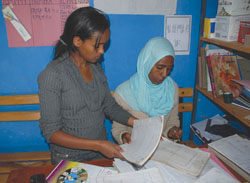
These rights and obligations extend to the general level of service that is provided by healthworkers such as Health Extension Practitioners (Box 9.1). For example, you may have made an agreement with your community to supply insecticide treated bed nets (ITNs) and it is therefore your duty or obligation to make sure that these are supplied in an effective and timely manner. In the same way the community has the right to receive these nets from the health service as a result of your work.
Imagine that you are a Health Extension Practitioner working in a rural community where there are lots of health problems. What are your obligations? What are the rights of your community?
In simple terms it is your obligation to provide the very best health service that you are able to provide. The community also has the right to receive the best health service possible within the constraints of the service.
Box 9.1 Definitions and types of rights and obligations
- Rights are generally defined as something that is owed to an individual according to just claims, legal guarantees, or moral or ethical principles. The two main categories of rights includes:
- Legal rights are based upon a legal entitlement to some good or benefit. These rights are guaranteed by laws and if violated can be punished by the legal system.
- Ethical rights are based upon moral or ethical principles. Ethical rights usually do not have the power of law to enforce the claim.
- Obligations are demands made upon individuals, professions, society, or government to fulfill and honour the rights of others. The two main categories of obligation include:
- Legal obligations are those obligations that have become formal statements of law and are enforceable under the law. For example,all healthworkers have a legal obligation to provide safe and competent care for patients assigned to them.
- Moral obligations are those obligations that are based upon moral or ethical principles, but are not usually enforceable under the law. For example, there is no legal obligation for a health provider on a vacation trip to stop and help an automobile accident victim. (Adapted from: Aiken, T. and Catalano, J. (1994) Legal, Ethical and Political Issues in Nursing. Philadelphia: F.A.Davis & Co. pp. 25–6.)
Look again at Box 9.1. What is the main difference between ethical rights and legal rights?
Legal rights have the force of the law behind them. If these items are not delivered the law can become involved. Ethical rights, on the other hand, do not usually have the power of the law behind them. The same can be applied to the difference between moral and legal obligations, in which case only legal obligations have the power of the law to back them up.
9.2 Duties and obligations of Health Extension Practitioners
In Section 9.1 you have learnt about the concept of rights and obligations; in this section you will study in more detail the duties and obligations of the Health Extension Practitioners based on the values set out in Box 9.2.
Box 9.2 Ethical values for Health Extension Practitioners
- Safe, competent and ethical service: Health Extension Practitioners should value the ability to provide a safe, competent and ethical healthcare service that allows them to fulfil their ethical and professional obligations to the people they serve.
- Health and wellbeing: Health Extension Practitioners value health promotion and wellbeing, and assisting people to achieve their optimum level of health.
- Choice: Health Extension Practitioners respect and promote the autonomy of people and help them to express their health needs. They also help them to obtain desired information and services so they can make informed decisions.
- Dignity: Health Extension Practitioners recognise and respect the inherent worth of each person and advocate the respectful treatment of all people.
- Confidentiality: Health Extension Practitioners safeguard information learned in the context of a professional relationship, and ensure it is shared outside the healthcare team only with the person’s informed consent or as may be legally required, or where the failure to disclose would cause significant harm.
- Justice: Health Extension Practitioners uphold principles of equity and fairness to assist people in receiving a share of health services and resources proportionate to their needs.
- Accountability: Health Extension Practitioners are answerable for their practice, and should act in a manner consistent with their professional responsibilities and standards of practice. (Adapted from: Canadian Nurses Association: Code of Ethics for Registered Nurses, 2002)
Look carefully at the contents of Box 9.2. Which ethical value would you say was the most important for Health Extension Practitioners to use in their work?
Each one of these ethical values are really important and will ensure that the work of Health Extension Practitioners is carried out to the highest possible standards.
9.2.1 Providing a safe, competent and ethical service
As a Health Extension Practitioner you should value your ability to provide safe, competent and ethical care that allows you to fulfill your ethical and professional obligations to all the people in your community (Figure 9.2). You must strive for the highest quality of care you can achieve, at the same time recognising that you have moral choices that you have the right to express and exercise.
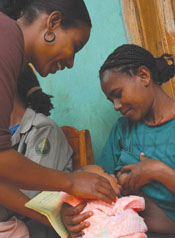
Suppose you are planning to provide family planning services to all female clients who are in need of it. However, the amount of contraceptives supplied to you is limited and also you don’t have all the different types of contraception that the women might want to use. It doesn’t satisfy the needs of all your clients. What is your moral choice as a Health Extension Practitioner?
As a Health Extension Practitioner your moral obligation will be to provide all your clients with contraceptives of their own preference, but you have resource constraints that influence the standard of your service. You will have to do the best that you can to provide the most effective service that you can for the greatest number of people. At the same time it should be your obligation to inform the managers of your service of your difficulties and press for increased resources for your community.
In order to make moral choices, you should be clear enough about your personal values to be able to recognise potential value conflicts in your work. These value conflicts are issues occurring in everyday working life which will force you think about how they can be resolved. For example, if a pregnant woman in your care insists on giving birth at home even though you counsel her that she and her baby are in possible danger because of complications, there is clearly a conflict of values here. She values the right to give birth in her familiar surroundings, despite the health risks. You value protecting her life and that of the baby more than you value giving in to her opinion.
In the example given above, the woman wants to deliver her baby at home despite the potential risks that you have pointed out. How do you think this value conflict could be resolved?
The woman who is about to give birth clearly has the right to autonomy over her own body. You will remember that this principle was discussed earlier in the Module. It is her body and she has the right to take decisions about her own health. However in this situation the rights of the unborn baby are also important. This baby also has rights although is unable to express them at this stage. The baby might be protected by law (a legal right), although in practice it is very unlikely that the law could be enforced in this situation.
During your course of study as a Health Extension Practitioner, you will acquire sufficient knowledge and skill that will enable you to practice competently; this is your moral right. Your teachers and trainers have a moral obligation to tell you all about the things you will need to know in order to be able to work competently in your community. On the other side of the coin you are expected to work only within the level of competency that you have been trained for, and this is your moral obligation. You should not attempt to perform things that are more difficult than the level of skill that you have been trained to do. For instance, if a labouring mother with a transverse lie comes to give birth in your Health Post, you have a moral obligation to refer her to an institution where she can get better care (Figure 9.3). Your competency as a Health Extension Practitioner should include the ability to recognise when a situation is too difficult for you to handle by yourself and when, therefore, you need to make a referral.

Suppose a mother brings her five-year old child to your Health Post with the main complaint of cough and fever of three days’ duration. When you examine the child, you find that the child has a temperature of 39ºC, flaring nose and shortness of breath. You reach the conclusion that the child’s problem is an Acute Respiratory Infection (ARI), possibly pneumonia. What will be the next step that you are expected to do as a Health Extension Practitioner?
You should provide the tablets that can control a fever that are available at your Health Post and refer the child to the next referral level (health centre), where they can get more advanced treatment. In this case your obligation and competence has ensured that you have made a diagnosis and a referral as well as given all appropriate immediate care.
9.2.2 Health and wellbeing
As a Health Extension Practitioner, your work mostly focuses on the prevention of diseases and the promotion of health as well as providing some basic curative services. Your care is always directed towards the health and wellbeing of individuals, families and your entire community. When you deal with health problems you need to explore the social, economic, psychological, cultural and behavioural factors that can affect the health and wellbeing of the people under your care, and you have an obligation to inform and involve individuals, families and your entire community to help them make decisions on their own health problems (Figure 9.4).
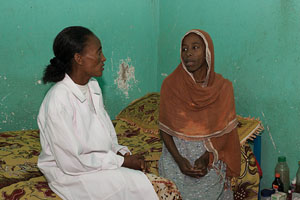
Why do you think you have an obligation to consider a large number of factors when trying to improve the health of your population?
The health of your population will depend on many different factors including social, cultural and economic factors. Although you may not have direct control over these factors you should take them into account when working with your community.
9.2.3 Choice
Communities in your locality have a fundamental right to receive certain healthcare services, for instance immunization and family planning services. They also have the right to choose the ways that they work towards the improvement of the health of their own community. As a Health Extension Practitioner you have an obligation to respect both sets of rights. Part of your work will include an obligation to provide health information and support to the individuals and the entire community so they are able to make informed decisions about health issues (Figure 9.5). For instance, if a mother with seven children refuses to use family planning services, you have a moral obligation to inform her about the physical, social and economical consequences of having more children. However, it remains her choice under the principle of autonomy whether or not she uses contraception.
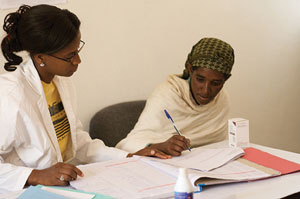
If you are working in a community where there is a lot of malaria, how do you think you will be able to help your community to make choices about ways that this might be tackled?
Your work should include helping the community decide where they can best use their resources. Perhaps your knowledge will help them look for possible wet areas near the village where the mosquitoes will be breeding. Together they may decide to drain these areas rather than use their energy in ways that are not going to be effective in reducing the amount of malaria.
9.2.4 Confidentiality
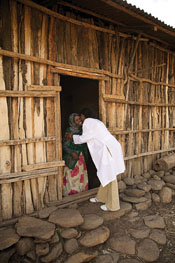
Many people think details about their own health are really personal matters and they certainly do not want other people to have access to these intimate details about themselves. Confidentiality is the control of disclosure of this personal health information and limiting access of these personal matters to others. It is one of the ethical principles that any healthcare provider must follow. If healthworkers do not follow this principle, clients may decide not to seek their help for fear of their private details becoming widely known.
As Health Extension Practitioners, you will be dealing with individual, family and community health problems, and you may come across health issues that need to be kept confidential (Figure 9.6). You certainly do have the moral obligation to respect the principle of confidentiality for people under your care. You should always keep health problems confidential unless you get informed consent from your client to tell others.
Imagine you are working at a Health Post and one of the young women comes in to tell you that she thinks that she may be pregnant. Later in the day her mother asks you whether you think her daughter is pregnant or not. How should you respond?
It would certainly be a serious breach of confidence if you gave your opinion to the mother of your patient. You must not give any clues about the consultation that took place earlier in the day, even if you are sure that the mother is really well meaning. You can tell her kindly that this information is confidential between you and your client. Hopefully this will also teach the mother about the meaning of confidentiality and she may not put you in this difficult position again.
9.2.5 Justice
Justice is the obligation to be fair in your health work to all the people for whom you are responsible. Justice means that individuals, families or communities should be treated fairly regardless of their ethnicity, culture, spiritual beliefs, social or marital status, gender, age, health status, and mental or physical disability. Even if something happened to you and you developed a disability, you would still be the same person and would want to be treated fairly. As a Health Extension Practitioner, you also have a moral obligation to be fair to all people in your locality while providing health services (Figure 9.7). You should look on ways that all health resources are used and try to bring about maximum good (beneficence) and serve the largest number of people (utilitarianism).
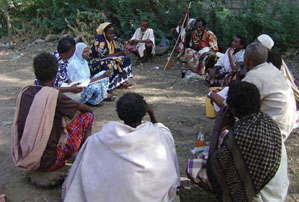
Imagine that you are a Health Extension Practitioner and your woreda has given you a sum of money to improve the health of your population. You also need a new water supply for the sink in your Health Post. How should you spend the money?
Although you need water for your sink you should think carefully if this is the best way to spend the extra money. The way to decide would be to ask the people in your community what they think would be the best way that this extra money should be spent. Perhaps they will agree with you that a clean water supply to the Health Post is a priority!
9.2.6 Accountability
As a Health Extension Practitioner you are responsible to the people in your community to promote, protect and meet the health needs of individuals and those of the whole community. You are also accountable to them to justify how you go about your work. Are you doing your best for the welfare of the people (beneficence)? You have a moral obligation to respect and practice within your professional standards and meet the competencies established for all healthworkers in your position. Moreover, you are required to provide timely and adequate feedback to your professional colleagues, to report colleagues’ incompetence and unethical practices, and to withdraw when you are feeling unable to provide satisfactory healthcare services.
Sindhu is a Health Extension Practitioner. She had been a good and competent practitioner, loved and respected by her clients, colleagues and everybody in the neighbourhood. She has now become very low in her mood and the service she is providing to her clients is below what is expected by her professional standards. Her work is becoming disorganised and it is clear that many of her competencies are not being met. Some of her colleagues would like her to stop practising, but do not wish to tell her so. As a Health Extension Practitioner working in the next village, what should you do?
This is a very sad situation, but it is clear that something has to be done so that the health of Sindhu’s community is protected. Accountability is an important part of the work of all healthworkers. It is also clear that your responsibility includes taking the steps that will ensure that the standard of the Health Extension Programme is maintained. You should talk with your other colleagues and consider whether you need to talk to Sindhu or one of your supervisors about this problem.
Summary of Study Session 9
In Study Session 9, you have learned that:
- Rights and obligations are two terms that are inseparable. If there is a right claimed by some individuals then there will also be somebody else’s obligation to fulfill that claim. For instance, if a pregnant woman requests antenatal care you have a moral obligation to provide that service.
- Some rights are legally enforceable and others are ethically or morally important, although not backed up by the weight of the law.
- Obligations can similarly be either morally or legally enforceable. Although some obligations may not be legally enforceable it doesn’t mean that they should not be considered to be necessary.
- Health Extension Practitioners have an obligation to provide safe and competent services to individuals, families and their whole community. This includes an acceptable level of respect, confidentiality and accountability.
Self-Assessment Questions (SAQs) for Study Session 9
Now that you have completed this study session, you can assess how well you have achieved its Learning Outcomes by answering the following questions. Write your answers in your Study Diary and discuss them with your Tutor at the next Study Support Meeting. You can check your answers with the Notes on the Self-Assessment Questions at the end of this Module.
SAQ 9.1 (tests Learning Outcome 9.1)
Fit these words into the following short paragraph: justice; rights; obligation; confidentiality.
The Health Extension Worker was aware of her ______ to provide a high quality service to the people in her community. She knew that all the people she was looking after had ______ and could expect her to keep their health problems secret and maintain ______ at all times. They knew that she would treat them all equally and be fair. They respected her sense of ______ and were confident that she would be able to sort out any value conflicts that might occur.
Answer
The Health Extension Worker was aware of her obligation to provide a high quality service to the people in her community. She knew that all the people she was looking after had rights and could expect her to keep their health problems secret and maintain confidentiality at all times. They knew that she would treat them all equally and be fair. They respected her sense of justice and were confident that she would be able to sort out any value conflicts that might occur.
Read Case Study 9.1 below and answer the questions that follow.
Case Study 9.1 Chaltu faces an ethical issue
Chaltu, a Health Extension Practitioner, is approached by Almaz, a young woman in her community, to discuss an issue regarding the termination of her pregnancy. Almaz says, ‘My abdomen is increasing in volume and is reaching a visible size. I am becoming anxious and frustrated because if my parents know my problem they will automatically send me away from home. If this happens I will have to commit suicide because I don’t have any place to go. I come here to ask for your assistance in terminating the pregnancy, but please don’t tell anyone about this issue – including my parents.’
SAQ 9.2 (tests Learning Outcomes 9.1 and 9.2)
Look at Case Study 9.1. What rights does Almaz have in this situation? Does she have legal or ethical rights?
Answer
Almaz has the right to use the health service and be treated with respect and sympathy. This does not mean that every request has to be carried out, but that the health service, including the Health Extension Practitioner has to consider her request. She also has a right to be treated confidentially. The Health Extension Practitioner must not inform her parents or others in authority about her situation. These are largely ethical rights but could be challenged in law.
SAQ 9.3 (tests Learning Outcome 9.3 and 9.5)
What ethical and legal obligations does Chaltu, the Health Extension Practitioner, have in this case?
Answer
Chaltu has the ethical and legal obligation to treat Almaz with sympathy and respect her need for privacy and confidentiality. She also has an obligation to give the correct information to her client about many issues that may be relevant. For example, Almaz would be considered for a legal abortion at the health centre or in a hospital if the father of her expected child is a close relative (incest), if the pregnancy was the outcome of a rape, or if Almaz herself was considered to have a serious mental or physical illness. Chaltu also has to tell Almaz about the problems that might develop if she went to an illegal abortionist.
SAQ 9.4 (tests Learning Outcome 9.4 and 9.5)
What professional obligations does Chaltu have regarding confidentiality and truthfulness in this situation?
Answer
Confidentiality and truthfulness are the key obligations for the Health Extension Practitioner to remember in this situation and in all health work. These are professional obligations and they set Health Extension Practitioners apart from other members of the community.